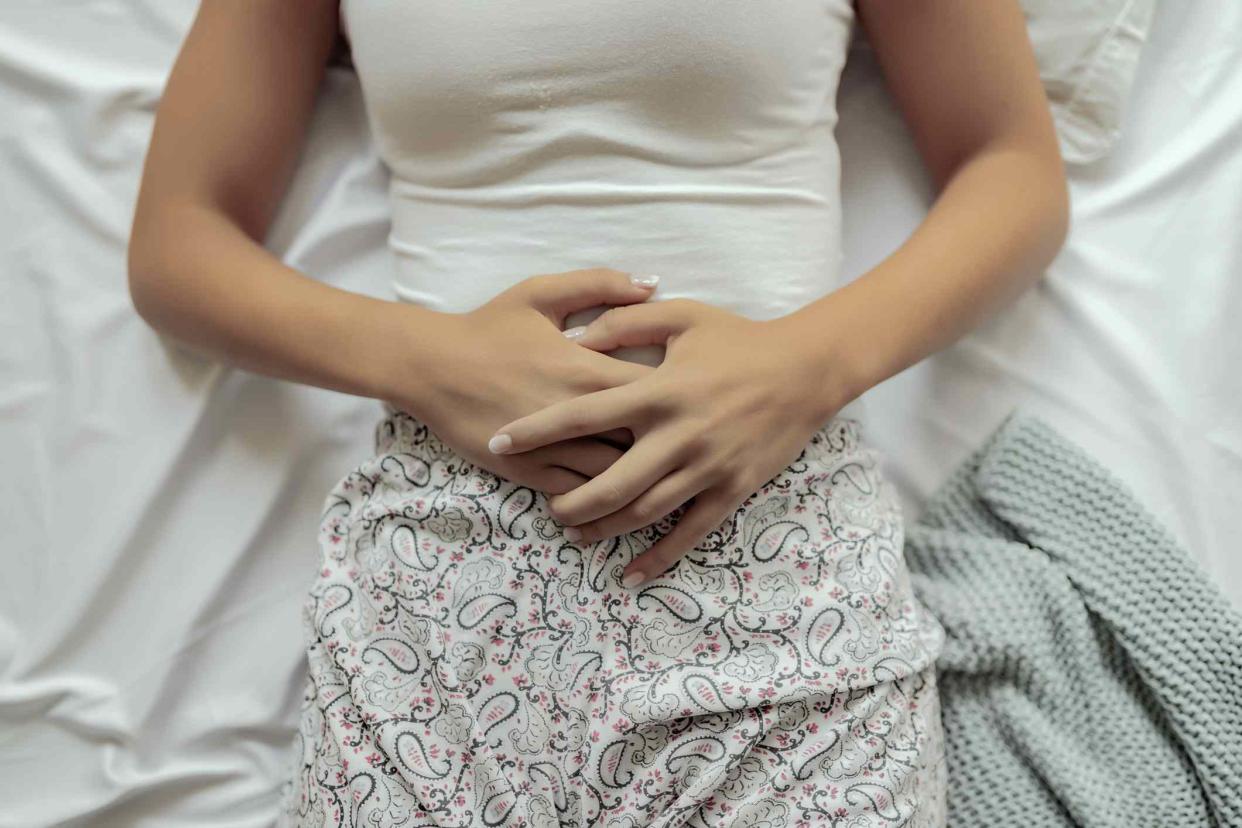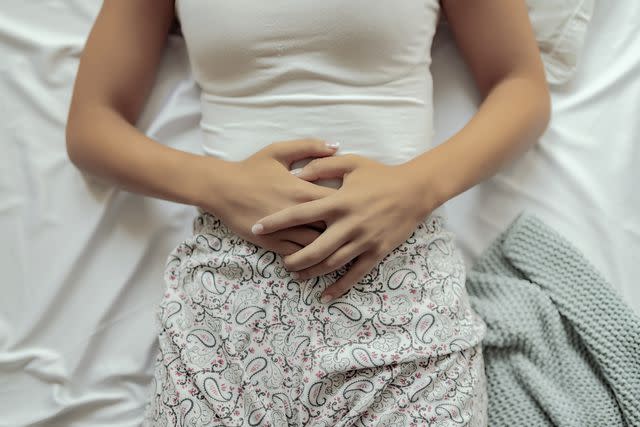Can Endometriosis Kill You?

PixelsEffect / Getty Images
Endometriosis is not considered fatal, but it can lead to complications that are potentially life-threatening, such as bowel obstruction or ectopic pregnancy. Endometriosis can also cause symptoms that affect quality of life, such as pelvic and abdominal pain, bloating, and problems with fertility. Treatments are available to help manage these symptoms and prevent serious complications.
This article will discuss what endometriosis feels like, its potentially life-threatening complications, its severe symptoms and complications, and what treatments are available for endometriosis.

PixelsEffect / Getty Images
What Does Endometriosis Feel Like?
Endometriosis feels different for each person who has it. Some people experience severe symptoms, while others may have no noticeable symptoms.
Common symptoms of endometriosis include:
Pelvic or abdominal pain that can feel like cramping or daggerlike and may be severe
A pulling sensation within the pelvis or abdomen
Painful periods
Pain during or after sex (often described as a "deep" pain)
Pain during bowel movements and/or urination
Digestive symptoms such as bloating, constipation, diarrhea, or nausea
Problems with fertility
Chronic pain in the lower back or pelvis
Potentially Fatal Complications of Endometriosis
Endometriosis can cause scar tissue to form inside the pelvis or abdomen and on nearby organs. This can lead to adhesions, which occur when endometrial tissue that forms on one organ binds it to another, such as an ovary being held to the pelvic wall.
Some people with endometriosis don't experience noticeable symptoms from adhesions and scar tissue, and may not know they have it; however, it can cause pain, symptoms related to the affected organs, and in some cases, life-threatening complications such as ectopic pregnancy or bowel blockage.
Bowel Obstruction
Endometrial tissue can grow on the bowels, most commonly on the recto sigmoid site (an S-shaped area of the colon that connects to the rectum). This can cause symptoms such as abdominal pain, rectal pain, and digestive problems.
Rarely can the bleeding and scar tissue that result from endometriosis on and around the bowel cause a bowel perforation (a hole in the bowel) or a bowel obstruction (blocking of the bowel). This can reduce blood flow to the intestines and can be life-threatening.
Bowel obstruction caused by endometriosis typically requires an emergency surgical procedure to remove the blockage.
Ectopic Pregnancy
An ectopic pregnancy means that a fertilized egg implants and grows in an area outside the uterus. This type of pregnancy is nonviable and cannot be saved. More than 90% of ectopic pregnancies occur in the fallopian tube.
Endometrial tissue can obstruct the fertilized egg from traveling to the uterus, making it a risk factor for ectopic pregnancy.
The growing embryo can cause the tube to rupture. This can lead to life-threatening internal bleeding and requires emergency surgery.
Early symptoms of an ectopic pregnancy are similar to those of a typical pregnancy, including:
Low-back pain
Abnormal vaginal bleeding
Mild pain in the pelvis or abdomen
Mild cramping on one side of the pelvis
Talk to your healthcare provider if you experience any of these symptoms.
Serious symptoms can develop as the pregnancy grows, particularly if there is a fallopian tube rupture. Go to an emergency room if you experience any of the following:
Sudden, severe pain in the abdomen or pelvis
Shoulder pain
Fainting, weakness, or dizziness
Can Endometriosis Cause Cancer?
Some studies show that endometriosis is a risk factor for ovarian cancer, but research on whether endometriosis can raise the risk of developing endometrial cancer or breast cancer is conflicting.
While there is an increased risk of developing ovarian cancer with endometriosis, the increased risk appears slight and the risk is still low. It is important to be aware of the increased risk, but most people with endometriosis will not get ovarian cancer.
Untreated Endometriosis
If untreated, endometriosis can cause severe symptoms or complications in some people.
Severe Symptoms and Complications
Endometriosis can lead to severe symptoms and complications such as:
Adhesions: Endometriosis tissue can bind organs together.
Ovarian cysts (chocolate cysts): Menstrual blood-filled cysts may form in the ovaries, which can become large and painful.
Bladder problems: Problems such as difficulty urinating can arise from endometrial tissue affecting the bladder. This may require surgery, which can involve cutting away part of the bladder. A urostomy (a bag attached to a small hole in the abdomen to collect urine) may sometimes be needed but is usually temporary.
Bowel problems: Endometriosis in or around the bowel may need to be surgically removed, which can involve removing a section of the bowel. A temporary colostomy (stool is collected in a bag attached to a hole in the abdomen) may be needed while the bowel heals.
Scar tissue: This can develop from inflammation with endometriosis or from surgery to treat endometriosis.
Problems with fertility: Endometriosis is highly associated with difficulty conceiving.
Pregnancy complications: A pregnant person with endometriosis may have a higher risk of preterm birth, miscarriage, placenta previa, babies that are small for gestational age, and cesarean delivery.
Abnormal uterine/menstrual bleeding: If severe enough, blood loss may require iron therapy or a blood infusion.
Mental health difficulties: People with endometriosis often experience mild to high psychological stress and may be at an increased risk for depression.
Quality of life: Endometriosis can impact several aspects of quality of life, including sleep, stress, activity levels, sex, relationships, and work.
Frozen pelvis: This is the most extensive form of deep infiltrative endometriosis (when endometriosis tissue invades other nearby organs). It adheres pelvic organs together from adhesions wrapping around organs, attaching to the lining of the abdomen or pelvic walls, creating weblike structures between organs, and/or extending to deeper tissues (affecting the nerves, lymph nodes, and muscle layers of organs). It can cause organs and soft tissues in the pelvis to harden, causing severe symptoms (such as pain and/or significant bowel habit changes), and require surgery.
While more research is needed, endometriosis has also been linked to other health conditions, such as:
Autoimmune diseases, such as multiple sclerosis, lupus, and some types of hypothyroidism (underactive thyroid)
Asthma
Allergies and chemical sensitivities
Is Untreated Endometriosis Fatal?
Endometriosis isn't considered fatal, but it can lead to complications and conditions that are life-threatening in severe cases. Treatment can help manage symptoms and lower the risk of serious complications.
Avoiding Complications With Endometriosis Treatment
Treating endometriosis can help manage the conditions and its symptoms. Treatment may also help avoid complications.
Treatment for endometriosis can include:
Hormonal birth control: Such as the pill, injection, or intrauterine device (IUD)
Gonadotropin-releasing hormone (GnRH) agonist and antagonist: Helps control the growth of endometriosis tissue by causing a temporary menopause
Surgery
If needed, surgery can help manage endometriosis and slow its progress.
Surgery may include:
Laparoscopy: Surgical procedure using small incisions to diagnose endometriosis and to remove endometriosis tissue and scar tissue
Hysterectomy: Surgical removal of the uterus and sometimes ovaries and fallopian tubes
While surgery can help remove tissue that leads to adhesions, the surgery itself may increase the chance of adhesions forming. It's important to talk with your healthcare provider to weigh the benefits and risks of surgery.
When to Seek Care
If you have symptoms of endometriosis, talk to a healthcare provider, particularly if the symptoms are impacting your life. It's important to get a proper diagnosis and an appropriate treatment plan.
Signs to call a healthcare provider may include:
Painful periods, particularly if they are more painful than they were previously
Pain during intercourse
Pain is interfering with daily activities
Bladder issues, such as pain with urination, blood in urine, or difficulty controlling the flow of urine
Bowel issues, including pain, unexplained change in bowel movements, or blood in your stool
You have not become pregnant after 12 months of trying to conceive
Back pain or other symptoms that reoccur after endometriosis treatment
Any symptoms you want to discuss
Seek emergency treatment if you experience:
Sudden, severe pelvic pain
Dizziness or lightheadedness due to heavy menstrual blood loss
Any symptoms you feel are an emergency
Summary
Endometriosis is not considered fatal, but it can lead to complications that may be life-threatening, such as ectopic pregnancy and bowel obstruction.
Endometriosis can also cause serious symptoms and complications, such as problems with fertility, bladder and bowel problems, ovarian cysts, adhesions, and a frozen pelvis. Endometriosis has been linked to increased ovarian cancer, but the risk remains low.
Treating endometriosis with medications such as hormonal birth control or with surgery may help reduce the risk of severe complications. Talk to a healthcare provider about whether treatment might be beneficial for you.

